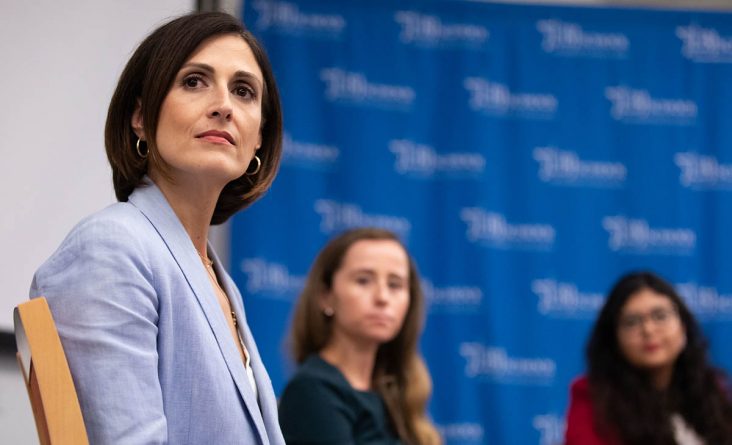New Clinton School dean to build on success with academic programs, continued partnerships
by April 3, 2022 10:04 am 1,302 views

Photo: Dr. Victoria DeFrancesco Soto courtesy of University of Texas.
Dr. Victoria DeFrancesco Soto, the new dean of the University of Arkansas Clinton School of Public Service, is no stranger to politics, political science or public service. Approaching her first 100 days in charge of the Little Rock-based campus, she sees a great base of success and hopes to build on it.
“Skip [Rutherford, the former dean], he left an incredibly strong foundation upon which I can write the next chapter of the Clinton School,” DeFrancesco Soto said.
She’s spent most of her first three months in Little Rock listening to faculty, administrators, and students. From that, she’s ready to institute some advancements.
“I’ve charted out a couple of paths with our leadership team, with our faculty. For example, we’re going to start two new certificate programs. We have a fantastic masters of public service – which by the way was the first in the country – but we also hear that students want to focus on data sciences, program evaluation and get that expertise noted in their transcripts, in their resumes, as well as communications and leadership for social change.”
She’s bringing in two new faculty members to execute some of that change, she said, as well as adding an “admitted student” weekend in the Fall to showcase Little Rock and what the school has to offer.
“We have so much richness here in Little Rock and once prospective students come and they see what a great city Little Rock is and what a great institution the Clinton School is, then we’re able to pull them in and get the best and the brightest here at the Clinton School,” DeFrancesco Soto said.
Dr. Brandon Merrell and Dr. Abigail Vaughn, both with the Georgia Institute of Technology, will join the Clinton School faculty on July 1. Merrell’s research examines how international processes affect global development, inequality, and political violence. Vaughn’s research focuses on financial inclusion, global governance, and political stability in emerging market economies.
The Clinton School’s curriculum is predicated on field service. Students spend time in communities across Arkansas, the U.S. and around the world working on public service projects that provide real world experience and problem solving. DeFrancesco Soto said she wants to expand on this aspect of the college.
“This is really the crown jewel in our program and what sets us apart from peer institutions that we have an in-depth service-learning component. Close to 50% of our credit hours are in the field where you’re not just thinking but you’re doing, and you’re putting both of those together,” she said.
“We want to be able to recruit more partners, both here locally, regionally, but also given this virtual world that we have seen open up because of the pandemic, it’s also opened up opportunities to do practicums with folks across the country. Our international service project is one of the strongest suits of the school. We want to push that farther out,” she added. “We’re a high-touch program and we pride ourselves in the faculty-to-student ratio. You’re not going to a school where the incoming class is 150 students or you get lost in the crowd. We’re a smaller boutique school and I want to own that.”
It doesn’t hurt that former President Bill Clinton serves as “professor-in-chief.” Founded in January 2004, the Clinton School is part of the University of Arkansas System. Since its inception, the Clinton School has been a collaborative effort among its three accredited sponsoring institutions – the University of Arkansas, Fayetteville, the University of Arkansas Little Rock, and the University of Arkansas for Medical Sciences.
Beyond overseeing the public service college, one may find DeFrancesco Soto’s face familiar. She is a political analyst for NBC News and Telemundo.
Her background in civic engagement, women, immigration, Latinos and political psychology has given her a wide breadth of insight into the changing dynamics in modern political activity.
When asked about the state of American politics, which is deeply divided and shows little course for reversal in the near-term, DeFrancesco Soto said what she’s witnessed in her lifetime leads her to have hope the political system will heal.
“A lot of my optimism comes from lived experience. I grew up in rural Arizona, I’m a border kid and I saw folks with very different world views – Republicans, Democrats, rural, urban – find common ground. So when I say that folks can find common ground, even though it’s become more difficult, I say it from experience and I say it because I have seen it,” she said.
“It’s beginning with what folks share in common rather than focusing on what we don’t share in common. And in addition to that, it is having the difficult conversations. And in the public speaker series, one of the things that the Clinton School did very well was bring together folks from different sides of the aisle. That’s something I want to continue doing because if we’re not talking, even if we don’t get along all the time or we don’t particularly like each other, we do need to focus on that bigger picture of how we move forward as a society. How do we come together to solve the big problems that need to be addressed?” she added.
You can watch Dr. DeFrancesco Soto’s full interview in the video below.
